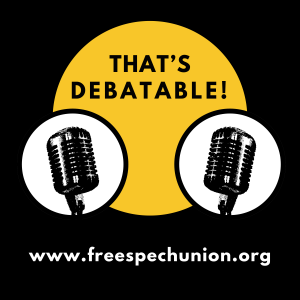
Monday Jun 16, 2025
In Defence of Banter and Books
That’s Debatable!’ is the weekly podcast of the Free Speech Union. Hosts Tom Harris and Jan MacVarish – both staffers at the FSU – talk about the free speech controversies that have erupted in the past week. Please like, subscribe and share.
In this week’s episode, Jan Macvarish and Connie Shaw discuss the FSU’s campaign against the ‘banter ban’. Connie describes legislative reforms that are being proposed as part of the government’s Employment Rights Bill and the problems the FSU has identified with them for free speech. FSU General Secretary addressed the audience at last week’s Comedy Unleashed gig and interviewed comedians including Andrew Doyle, Josh Howie and Francis Foster, about the prospect of ‘banter bouncers’ in venues, clubs and pubs. You can find out more and watch the video here.
Toby also appeared on Sunday’s Free Speech Nation (around 1 hour 35 minutes in) to discuss the bill with Andrew Doyle. Connie encourages viewers and listeners to use our special online tool to alert members of the House of Lords to the dangers of the Bill and to encourage them to support Lord Young’s amendments. It’s not just the FSU that has identified problems - the Equality and Human Rights Commission (EHRC) has also warned of the ‘risk of unintended consequences’ and counselled the need to ‘balance…rights to freedom from harassment and freedom of expression’. You can read their briefing here.
Connie then introduces a news story she spotted about a US school-teacher who has been threatened with the sack for reading an unedited passage of To Kill A Mockingbird to pupils. She and Jan discuss how children need to be able to understand the context in which words gain their power and the role of teachers in guiding them through linguistic taboos that have changed over time. They then go on to talk about Ray Bradbury’s dystopian novel Fahrenheit 451, written in 1953, which imagines a future America where books are banned and destroyed by fire. The novel explores the impact on memory, imagination and the ability to think and experience emotion that this has.
And finally, they return to the ‘banter’ question with an article reporting that a university researcher went undercover at his own golf club to analyse how jokes, innuendo and laddish banter forged a bonded but potentially exclusionary culture amongst golfers. The story raises questions about freedom of association, the role of humour in human relationships and research ethics.
Edited by Jason Clift